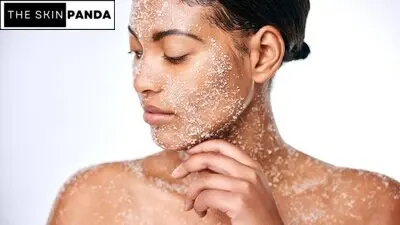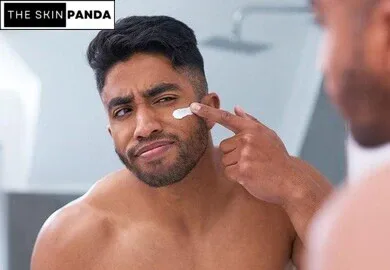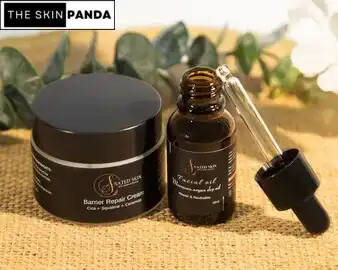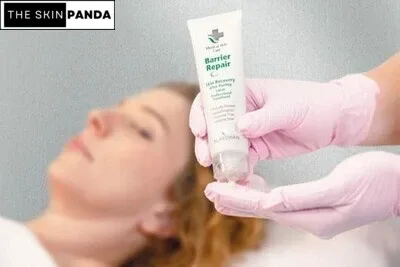Have you ever wondered how long does it take to repair skin barrier – your skin’s natural barrier? The answer isn’t one-size-fits-all. It depends on various factors, and we’re here to explore them with you. Let’s dive into the journey of restoring your skin’s health and resilience.
The skin is our body’s largest organ and serves as a protective barrier against external factors. But sometimes, our skin barrier can become compromised, leaving our skin vulnerable to various issues such as dryness, sensitivity, and irritation.
In these cases, it becomes crucial to repair the skin barrier to restore its health and function. But how long does it take for the skin barrier to repair itself?
On this page, we will explore the process of skin barrier repair and discover the factors that influence the healing time. So let’s dive in and learn more about how long it takes to repair the skin barrier.
What is a Skin Barrier?
The skin barrier, also known as the stratum corneum, is the outermost layer of the skin. It acts as a protective barrier against external irritants, allergens, and pathogens
The skin barrier is made up of lipids, proteins, and skin cells that work together to maintain the skin’s moisture balance, prevent water loss, and defend against harmful substances.
A healthy skin barrier is essential for maintaining overall skin health and preventing issues like dryness, irritation, and infections.
Composition of the skin barrier
The skin barrier, also known as the stratum corneum, is the outermost layer of the skin and plays a crucial role in protecting the body from environmental factors and maintaining overall skin health.
It consists of several key components, each contributing to its function. Here’s an overview of the composition of the skin barrier:
Corneocytes: Corneocytes are flattened, dead skin cells that make up the majority of the stratum corneum. These cells are densely packed and filled with a protein called keratin, which provides structural strength to the barrier.
Lipid Barrier: The lipid barrier is a critical component of the skin barrier. It consists of lipids (fats) that are secreted by the underlying living skin cells. The key lipid types include:
- Ceramides: Ceramides are a type of lipid that forms a significant portion of the skin’s lipid barrier. They help to create a waterproof seal, preventing excessive moisture loss and protecting the skin from external irritants.
- Cholesterol: Cholesterol molecules in the lipid barrier play a role in maintaining the integrity of the barrier and ensuring its flexibility.
- Fatty Acids: Fatty acids are another type of lipid that helps to provide flexibility to the lipid barrier.
Natural Moisturizing Factors (NMFs): NMFs are naturally occurring substances found within the corneocytes. They include molecules like amino acids, urea, and lactic acid. NMFs help to retain moisture in the skin, keeping it hydrated and supple.
Cell Junctions: The corneocytes in the stratum corneum are held together by specialized structures called desmosomes. These cell junctions provide structural integrity to the barrier, preventing the loss of skin cells and promoting cohesion.
Hydro-Lipid Film: The lipid barrier and NMFs work together to create a hydro-lipid film on the skin’s surface. This film helps to regulate moisture levels by preventing excessive water loss while also protecting against external factors like bacteria and pollutants.
Acid Mantle: The skin’s surface has a slightly acidic pH, often referred to as the acid mantle. This acidic environment helps to inhibit the growth of harmful microorganisms and maintain the health of the skin barrier.
Microbiome: The skin is home to a diverse community of microorganisms, including bacteria, fungi, and viruses, collectively known as the skin microbiome. A balanced microbiome is essential for a healthy skin barrier, as it helps regulate inflammation and maintain skin health.
Importance of a Healthy Skin Barrier

Having a healthy skin barrier is crucial for maintaining overall skin health. Here are the key reasons why it is essential:
1. Protection: The skin barrier acts as a protective shield against environmental irritants, allergens, and pathogens. It helps prevent these substances from entering the skin and causing inflammation or infection.
2. Moisture retention: The skin barrier plays a vital role in retaining moisture within the skin. It prevents excessive water loss, maintains hydration levels, and keeps the skin plump and supple.
3. Prevention of skin issues: A strong and intact skin barrier helps prevent common skin issues such as dryness, sensitivity, redness, and itching. It minimizes the risk of skin conditions like eczema, dermatitis, and psoriasis.
4. Enhanced skin function: A healthy skin barrier supports the proper functioning of the skin. It facilitates cell turnover, regulates oil production, and promotes a balanced pH level, which is essential for maintaining skin health.
5. Improved appearance: When the skin barrier is healthy, the skin appears smoother, brighter, and more radiant. It helps maintain a youthful and vibrant complexion.
6. Unbalanced Diet: Poor nutrition, specifically a diet lacking essential fatty acids, vitamins, and antioxidants, can impact skin health and the skin barrier’s ability to function optimally.
7. Stress: Chronic stress can trigger inflammation and negatively affect the skin’s barrier function.
8. Skin Conditions: Conditions like eczema, psoriasis, and rosacea can compromise the skin barrier’s integrity, making it more susceptible to damage.
9. Aging: As we age, the skin’s natural lipid production decreases, which can weaken the skin barrier and contribute to dryness and sensitivity.
10. Harsh Makeup and Makeup Removal: Certain makeup products, especially those containing alcohol or harsh chemicals, can irritate the skin and damage the barrier. Inadequate makeup removal can also contribute to damage.
11. Frequent Shaving: Frequent shaving, especially without proper lubrication or using dull blades, can disrupt the skin barrier and lead to razor burn and ingrown hairs.
12. Medications: Some medications, such as oral retinoids or acne treatments, can have side effects that impact the skin’s barrier function.
Factors that Damage the Skin Barrier

The skin barrier is a critical component of your skin’s health and appearance, serving as the first line of defense against external factors. However, it can be damaged by various environmental, lifestyle, and skin-related factors.
Understanding these factors is essential for preventing and addressing skin barrier damage. Here are some common factors that can harm the skin barrier:
1. Overwashing your face with harsh cleansers or hot water can strip away natural oils and disrupt the skin’s protective barrier.
2. Using abrasive exfoliants, scrubs, or chemical exfoliants too frequently can lead to irritation and damage the skin barrier.
3. Products containing strong ingredients like retinoids, alpha hydroxy acids (AHAs), or benzoyl peroxide, when used excessively or without proper care, can cause skin barrier damage.
4. Prolonged sun exposure without adequate protection can lead to sunburn and skin barrier damage. UV radiation can break down collagen and elastin, contributing to premature aging.
5. Environmental pollutants, such as particulate matter and airborne toxins, can penetrate the skin and cause oxidative stress, weakening the skin barrier.
6. Harsh winter conditions, with low humidity and cold temperatures, can dehydrate the skin and impair its barrier function.
7. Extended hot showers can strip away natural oils and moisture from the skin, leading to dryness and barrier damage.
Signs of a Damaged Skin Barrier

A damaged skin barrier can manifest itself in various ways, often resulting in discomfort and skin issues. Recognizing these signs is crucial for addressing the problem effectively.
Here are common signs of a damaged skin barrier:
One of the most noticeable signs is dry, flaky skin. When the skin barrier is compromised, it struggles to retain moisture, leading to dehydration and a rough, parched texture.
A damaged skin barrier is often associated with redness and irritation. Your skin may appear flushed, and you might experience itching, burning, or stinging sensations.
Sensitivity to skin care products, weather changes, or environmental factors can indicate a compromised skin barrier. Your skin may react more strongly to products that were previously well-tolerated.
Contrary to the misconception that oily skin doesn’t suffer from a damaged barrier, even those with oily skin can experience breakouts. The impaired barrier can make your skin more susceptible to acne and other blemishes.
A feeling of tightness or discomfort, especially after cleansing, is a sign that your skin’s natural balance is disrupted. This can be due to a weakened skin barrier.
Increased Trans-Epidermal Water Loss (TEWL): TEWL refers to the loss of moisture through the skin’s surface. A damaged skin barrier cannot effectively prevent this loss, leading to increased TEWL and drier skin.
Inflammation is a common response to a compromised skin barrier. Your skin may become swollen, puffy, or even develop pustules in response to the irritation.
The skin’s texture may become uneven, with areas of roughness or unevenness, which can make it harder to apply makeup smoothly.
A weakened skin barrier can accentuate the appearance of fine lines and wrinkles, making your skin look prematurely aged.
In severe cases, a damaged skin barrier may lead to allergic reactions, hives, or eczema-like symptoms as the skin becomes more susceptible to irritants and allergens.
How Long Does it Take to Repair Skin Barrier That is Damaged ?

The time it takes to repair a damaged skin barrier can vary depending on several factors, including the extent of the damage, individual skin type, and the effectiveness of the chosen treatments.
In general, repairing a damaged skin barrier is not an overnight process, and it may take several weeks to several months to see significant improvement. Here’s a more detailed breakdown:
Mild Damage vs. Severe Damage
The severity of the damage plays a significant role in the timeline for repair. Mild damage, such as occasional dryness or redness, may improve within a few weeks with proper care.
However, more severe damage, such as chronic conditions like eczema or a compromised barrier due to harsh treatments, may take several months of consistent care to heal fully.
General Timeline
On average, you can expect to see noticeable improvements in your skin’s barrier function within 2 to 4 weeks of adopting a skincare routine focused on barrier repair. However, complete recovery may take 6 to 12 weeks or even longer for severe damage.
Consistency is Key
Consistency in your skincare routine is essential. Daily adherence to gentle cleansing, hydration, and moisturization, as well as avoiding known irritants, will speed up the repair process.
Individual Variations
Keep in mind that individual variations play a role. Some people may experience quicker results, while others may need more time. Your genetics, age, and overall health can influence how your skin responds to treatment.
Underlying Conditions
If you have an underlying skin condition, such as eczema or psoriasis, it may take longer to repair the skin barrier, as these conditions require ongoing management.
Professional Help
If your skin barrier damage is severe or persistent, it’s advisable to consult a dermatologist. They can provide tailored treatment options and, in some cases, prescribe medications or procedures that may expedite the healing process.
Preventive Measures
Once your skin barrier is repaired, it’s crucial to continue with a skincare routine that supports its health to prevent future damage. This includes using gentle products and sun protection.
Patience and Persistence
Repairing a damaged skin barrier requires patience and persistence. It’s essential not to rush the process and to avoid over-exfoliating or using harsh products that can further exacerbate the damage.
In conclusion, while the exact timeline for repairing a damaged skin barrier varies from person to person, with the right care and consistency, you can typically expect to see improvements within a few weeks to a few months.
Remember that the goal is not just to repair the barrier but also to maintain its health to enjoy long-term benefits for your skin.
Steps to Repair a Damaged Skin Barrier

Repairing a damaged skin barrier requires a thoughtful and consistent skincare approach. Here are the essential steps to help you restore your skin’s natural protective function:
Gentle Cleansing
1. Choose a mild, fragrance-free cleanser that won’t strip your skin of natural oils.
2. Wash your face with lukewarm water, avoiding hot water that can be harsh on the skin.
3. Limit cleansing to once or twice a day to prevent overwashing.
Hydration and Moisturization
1. Use a gentle, hydrating toner to replenish lost moisture after cleansing.
2. Apply a moisturizer with barrier-strengthening ingredients, such as ceramides, fatty acids, and hyaluronic acid.
3. Choose a moisturizer suitable for your skin type (e.g., gel-based for oily skin, cream-based for dry skin).
Barrier-Repairing Ingredients
1. Look for products containing ingredients like ceramides, cholesterol, and fatty acids, which help rebuild the skin’s lipid barrier.
2. Niacinamide (Vitamin B3) can also support barrier repair and soothe irritated skin.
Avoid Irritants
1. Steer clear of skincare products with harsh chemicals, fragrances, and alcohol, which can further irritate your skin.
2. Check ingredient labels and opt for products labeled as “hypoallergenic” or “sensitive skin-friendly.”
Sun Protection
1. Always use sunscreen with broad-spectrum protection (SPF 30 or higher) to shield your skin from UV damage.
2. UV radiation can worsen skin barrier damage, so apply sunscreen daily, even on cloudy days.
Limit Exfoliation
1. Reduce or eliminate the use of abrasive scrubs, harsh exfoliants, or chemical peels until your skin barrier is restored.
2. If you choose to exfoliate, do it sparingly and with mild exfoliants suitable for sensitive skin.
Avoid Hot Water
1. Use lukewarm water for cleansing and bathing, as hot water can strip away natural oils and exacerbate dryness.
Humidify the Air
1. In dry environments or during the winter months, consider using a humidifier to maintain adequate indoor humidity levels, which can prevent further skin dehydration.
Balanced Diet and Hydration
1. Consume a balanced diet rich in essential fatty acids, vitamins, and antioxidants to support skin health.
2. Stay well-hydrated by drinking enough water throughout the day.
Stress Management
1. Practice stress-reduction techniques like meditation, yoga, or deep breathing exercises.
2. Chronic stress can exacerbate skin issues, so managing stress is crucial for skin barrier repair.
Professional Guidance
1. If your skin barrier damage is severe or persistent, consult a dermatologist for personalized advice and potential prescription treatments.
2. In some cases, a dermatologist may recommend specific skincare products or procedures to expedite the repair process.
Remember that repairing a damaged skin barrier takes time and patience. Consistency in your skincare routine, along with avoiding potential irritants and environmental factors, will contribute to the gradual restoration of your skin’s health and protective function.
Products and Ingredients for Skin Barrier Repair

When it comes to repairing a damaged skin barrier, selecting the right products and ingredients is crucial.
There are several skincare products and specific ingredients known for their effectiveness in promoting skin barrier repair and maintenance.
Here’s a list of products and ingredients that can aid in this process:
1. Moisturizers:
Ceramide-Enriched Moisturizers: Look for moisturizers containing ceramides, which are essential for replenishing the lipid barrier and preventing moisture loss.
Hyaluronic Acid-Based Moisturizers: Hyaluronic acid helps to attract and retain moisture in the skin, keeping it hydrated and plump.
Emollient-Rich Creams: Emollients like shea butter, cocoa butter, and plant oils provide a protective layer, reducing water loss and soothing dry, irritated skin.
2. Serums and Treatment Products:
Niacinamide (Vitamin B3): Niacinamide helps strengthen the skin barrier, reduce inflammation, and control excess oil production.
Hyaluronic Acid Serums: Serums containing hyaluronic acid can provide a hydration boost to the skin.
Peptide Serums: Peptides can stimulate collagen production and aid in skin repair and regeneration.
3. Sunscreens:
- Broad-Spectrum Sunscreens: Sunscreen with SPF 30 or higher is essential for protecting the skin from UV radiation, which can damage the skin barrier.
- Physical Sunscreens: Zinc oxide and titanium dioxide provide a physical barrier against UV rays and are gentle on sensitive skin.
4. Cleansers: Gentle, Hydrating Cleansers: Opt for mild, sulfate-free cleansers that don’t strip the skin of natural oils.
5. Barrier-Repairing Ingredients:
- Ceramides: Ceramides are crucial for rebuilding the lipid barrier and preventing moisture loss.
- Fatty Acids: Essential fatty acids like linoleic acid and oleic acid help restore the lipid balance in the skin.
- Cholesterol: Cholesterol helps maintain barrier flexibility and integrity.
- Panthenol (Vitamin B5): Panthenol can soothe and hydrate the skin, supporting barrier repair.
- Allantoin: Allantoin has soothing properties and can help reduce irritation.
6. Topical Antioxidants (Vitamin C): Vitamin C serums can protect the skin from oxidative damage and promote collagen synthesis, aiding in overall skin health.
7. Prescription Treatments: In severe cases of skin barrier damage, a dermatologist may prescribe topical treatments like topical corticosteroids, barrier repair creams, or prescription-strength moisturizers to expedite the repair process.
8. Avoid Irritants: In addition to using beneficial products, it’s equally important to avoid skincare products that contain harsh ingredients, fragrances, or alcohol, which can exacerbate skin barrier damage.
Professional Help for Skin Barrier Repair

Seeking professional help for skin barrier repair can be beneficial, especially when you’re dealing with severe or persistent skin issues.
Dermatologists are trained experts who can provide specialized guidance, treatments, and recommendations tailored to your specific skin condition.
Here are some ways in which a dermatologist can assist in the repair of your skin barrier:
Diagnosis and Assessment: Dermatologists can accurately diagnose the extent of your skin barrier damage and identify any underlying skin conditions that may be contributing to the problem. This assessment is crucial for developing an effective treatment plan.
Prescription Medications: For severe skin barrier damage or underlying skin conditions like eczema, psoriasis, or rosacea, dermatologists can prescribe medications such as topical corticosteroids, calcineurin inhibitors, or barrier repair creams to address inflammation and promote healing.
Procedures and Treatments: Dermatologists can perform in-office procedures like chemical peels, microdermabrasion, or laser therapy to improve skin texture, stimulate collagen production, and aid in skin barrier repair.
Recommendations for Skincare Products: Dermatologists can provide personalized recommendations for skincare products that are suitable for your skin type and condition. They can advise you on choosing cleansers, moisturizers, and treatment products that will promote barrier repair.
Allergy Testing: If allergens are suspected to be contributing to skin issues, dermatologists can perform patch testing to identify specific allergens causing skin irritation and guide you in allergen avoidance.
Guidance for Lifestyle Changes: Dermatologists can offer advice on lifestyle factors that may be affecting your skin barrier, such as dietary choices, stress management, and environmental factors.
Monitoring Progress: Regular follow-up appointments with a dermatologist allow them to monitor your skin’s progress and make adjustments to your treatment plan as needed.
Education and Prevention: Dermatologists can educate you about proper skincare practices and preventive measures to maintain a healthy skin barrier and reduce the risk of future damage.
How to Prevent Future Skin Barrier Damage

Preventing future skin barrier damage is essential for maintaining healthy and resilient skin. By adopting a proactive approach and making specific lifestyle and skincare adjustments, you can minimize the risk of further damage. Here are some key steps to prevent future skin barrier damage:
Gentle Cleansing:
Use a mild, sulfate-free cleanser to gently cleanse your face.
Avoid excessive scrubbing or harsh exfoliation, which can strip away natural oils and disrupt the skin barrier.
Hydrate and Moisturize:
Incorporate a moisturizer into your daily skincare routine to lock in moisture and support the skin barrier.
Apply moisturizer promptly after cleansing, while your skin is still slightly damp, to maximize hydration.
Barrier-Repairing Ingredients:
Choose skincare products containing barrier-strengthening ingredients like ceramides, fatty acids, and cholesterol.
Niacinamide (Vitamin B3) can help maintain a healthy skin barrier and reduce sensitivity.
Sun Protection:
Apply sunscreen with broad-spectrum protection (SPF 30 or higher) daily, even on cloudy days.
Protect your skin from UV radiation to prevent premature aging and barrier damage.
Avoid Irritants:
Be mindful of skincare products with harsh chemicals, fragrances, or alcohol, which can irritate the skin.
Patch test new products to check for potential sensitivities.
Limit Hot Water Exposure:
Use lukewarm water for cleansing and bathing to prevent the stripping of natural oils from the skin.
Humidify the Air:
Use a humidifier in dry indoor environments, especially during the winter months, to maintain proper humidity levels and prevent skin dehydration.
Balanced Diet and Hydration:
Consume a diet rich in essential fatty acids, vitamins, and antioxidants to support skin health.
Stay well-hydrated by drinking an adequate amount of water throughout the day.
Stress Management:
Practice stress-reduction techniques such as meditation, yoga, or deep breathing exercises.
Chronic stress can negatively impact the skin, so managing stress is crucial for skin barrier health.
Protect Against Environmental Factors:
Shield your skin from harsh weather conditions, such as cold winds or extreme heat, by wearing appropriate clothing and using protective measures like scarves and sunscreen.
Routine Dermatologist Checkups:
Schedule regular appointments with a dermatologist for skin assessments and advice on maintaining a healthy skin barrier.
Avoid Over-Exfoliation:
Be cautious with exfoliation and limit its frequency. Over-exfoliating can damage the skin barrier.
Use Gentle Makeup and Makeup Removal:
Choose makeup products that are formulated for sensitive skin and are free from irritating ingredients.
Ensure thorough but gentle makeup removal to prevent skin irritation.
People Also Ask (FAQs)
Question 1. What is the Fastest Way to Repair the Skin Barrier?
Answer: The fastest way to repair a damaged skin barrier is to prioritize gentle skincare practices. This includes using a mild cleanser, applying a barrier-repairing moisturizer, and avoiding harsh exfoliants. Additionally, consulting a dermatologist for expert advice and prescription treatments can expedite the healing process.
Question 2. How do you know if your Skin Barrier is Healing?
Answer: You can tell your skin barrier is healing when you notice reduced redness, irritation, and dryness. Your skin will feel more hydrated and less sensitive, and it will regain a smoother, more even texture. Gradual improvement in these areas indicates your skin barrier is on its way to recovery.
Question 3. What does a severely Damaged Skin Barrier Look like?
Answer: A severely damaged skin barrier appears red, inflamed, and irritated, often with noticeable dryness, flakiness, and sensitivity. It may also result in frequent breakouts or an uneven skin texture.
Question 4. What not to use when Repairing Skin Barriers?
Answer: When repairing a damaged skin barrier, avoid harsh exfoliants, alcohol-based products, and fragranced skincare, as these can further irritate and compromise the skin’s protective layer. Stick to gentle, hydrating, and barrier-strengthening products instead.
Question 5. Can Aquaphor Help Repair Skin Barrier?
Answer: Yes, Aquaphor can be effective in helping repair a damaged skin barrier. Its occlusive properties lock in moisture, creating a protective barrier that promotes healing and hydration.
Question 6. Is Vitamin C Bad for Damaged Skin Barrier?
Answer: Vitamin C, in the form of L-ascorbic acid, can be harsh for a damaged skin barrier due to its acidity. It’s advisable to consult with a dermatologist before using it on compromised skin to prevent potential irritation.
Question 7. Can I use Retinol if my Skin Barrier is Damaged?
Answer: Using retinol on a damaged skin barrier can be harsh and lead to further irritation. It’s best to wait until your skin barrier has healed before incorporating retinol into your skincare routine, and consult a dermatologist for personalized advice.
Question 8. Is Hyaluronic Acid Good for Damaged Skin Barrier?
Answer: Yes, hyaluronic acid is generally safe for a damaged skin barrier as it helps retain moisture. However, it’s essential to pair it with a suitable moisturizer to lock in hydration effectively.
Question 9. Can Niacinamide Destroy Skin Barrier?
Answer: No, niacinamide is typically safe and beneficial for the skin barrier. It can help strengthen the barrier, reduce inflammation, and improve overall skin health.
Conclusion
In conclusion, a healthy skin barrier is vital for maintaining vibrant and resilient skin. Recognizing the signs of damage, understanding its composition, and taking proactive steps for repair are essential.
With the right products, ingredients, and professional guidance, you can restore and protect your skin barrier.
Furthermore, practicing preventive measures, such as gentle skincare routines and sun protection, ensures long-term skin health.
Remember, patience and consistency are key to achieving and maintaining a strong and radiant skin barrier, allowing you to enjoy the benefits of glowing, well-protected skin for years to come.
Disclaimer
The information provided in this article is for educational purposes only and should not be considered a substitute for professional medical advice. It is essential to consult with a qualified healthcare provider or dermatologist for personalized guidance and treatment recommendations based on your specific skin needs and conditions. Any actions taken based on the content of this article are at the reader’s discretion.
